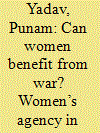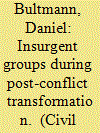| Srl | Item |
| 1 |
ID:
178723


|
|
|
|
|
| Summary/Abstract |
Women’s agency in Peace and Conflict Studies has received increased policy attention since the formulation of UN Security Council Resolution in 2000. Academic attention regarding this question has, as a result, also increased dramatically in the intervening period. Women today, as a consequence, are not just seen as victims of conflict, but also as agents of change. Despite their vulnerabilities in the situations created by conflict, women may be exposed to new knowledge and opportunities, which may have positive impacts on their lives. Therefore, it is important to recognize the lived realities and the multiple stories of postwar societies to address the new needs of people and build a sustainable peace. This article examines the everyday lives of women in post-conflict Nepal to demonstrate the significant transformations that have taken place since the war. It specifically investigates conflict-induced social and structural changes through the lived experiences of women tempo drivers, war widows, women ex-combatants and women politicians. This article is based on the analysis of 200 interviews and six focus group discussions (FGDs) carried out over a period of 12 years in seven districts of Nepal.
|
|
|
|
|
|
|
|
|
|
|
|
|
|
|
|
| 2 |
ID:
160363


|
|
|
|
|
| Summary/Abstract |
The article discusses the experiences of a group of military strongmen during the post-conflict transformation of two Cambodian insurgent movements into a society of peace after a decades-long civil war. It explains the reasons why some of these strongmen were able to transfer their high status within the insurgency into senior positions in the incumbent government, while others became impoverished and sometimes even preferred to relapse into further conflict. Even though all of these strongmen shared a very similar life course and fought until the end of the conflict, their post-conflict fates have been very different. Central to the explanation of their behaviour during the transition is their habitus, the set of resources at their disposal and the nature of their vertical and horizontal social networks.
|
|
|
|
|
|
|
|
|
|
|
|
|
|
|
|